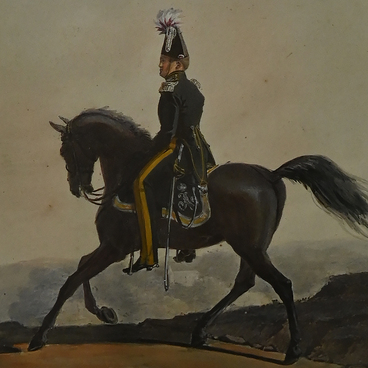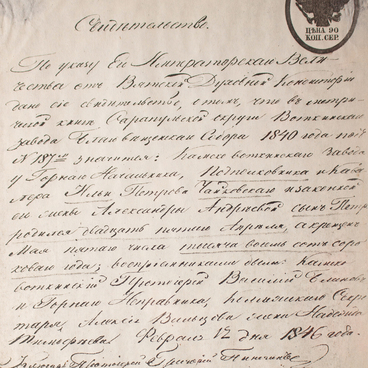The museum displays a white ribbon from a laurel wreath which the artists of the Tiflis (presently — Tbilisi) Theater gave to Pyotr Tchaikovsky in 1886. It is a long narrow white rep ribbon with rounded edges. A golden stenciled inscription has been preserved on it: ‘To Pyotr Tchaikovsky from the artists of the Tiflis Theater. April 19, 1886. Tiflis.’
In 1885, Tchaikovsky’s brother Anatoly was sent to serve in Tiflis. From 1885 to 1888, he was a prosecutor, and later appointed deputy governor of Tiflis.
Anatoly Tchaikovsky was fond of drama theater since childhood and took up violin. In the ancient Georgian city, he became a member of the Musical Society directorate. He and composer, conductor, and teacher Mikhail Ippolitov-Ivanov persuaded Pyotr Ilyich to come to Tiflis.
In April 1886, Tchaikovsky arrived in the city, where a festive evening party was held in his honor. The newspapers announced it as “a special concert of the Tiflis branch of the Russian Imperial Musical Society arranged in honor of the dear Tiflis guest, the most talented of modern Russian composers.” When the musical and public figure, philanthropist Konstantin Alikhanov welcomed the guest, he said: “Our small musical family, as well as the entire musical Russia, has long been familiar with your glorious name and considers you the creator of the Russian national symphony”. Tchaikovsky was presented with his portrait in a silver frame in the shape of a laurel wreath. Real wreaths were also gifted to him, “on the ribbons of which it is indicated, from representatives of which branch of musical art they are presented.”
The composer spent about a month in Tiflis. Leaving Georgia, he wrote to Ippolitov-Ivanov, with whom he made friends: “The month I spent in Tiflis is one of the most joyful and bright months in my life… I remember Tiflis with particular pleasure… I do not know yet whether I will be able to come to Tiflis in fall or winter. I would really, really like to and hope it will be so. I just need to live long enough and be healthy, there is no doubt that I am strongly attracted to Tiflis, and that I will be there one way or another.”
In 1885, Tchaikovsky’s brother Anatoly was sent to serve in Tiflis. From 1885 to 1888, he was a prosecutor, and later appointed deputy governor of Tiflis.
Anatoly Tchaikovsky was fond of drama theater since childhood and took up violin. In the ancient Georgian city, he became a member of the Musical Society directorate. He and composer, conductor, and teacher Mikhail Ippolitov-Ivanov persuaded Pyotr Ilyich to come to Tiflis.
In April 1886, Tchaikovsky arrived in the city, where a festive evening party was held in his honor. The newspapers announced it as “a special concert of the Tiflis branch of the Russian Imperial Musical Society arranged in honor of the dear Tiflis guest, the most talented of modern Russian composers.” When the musical and public figure, philanthropist Konstantin Alikhanov welcomed the guest, he said: “Our small musical family, as well as the entire musical Russia, has long been familiar with your glorious name and considers you the creator of the Russian national symphony”. Tchaikovsky was presented with his portrait in a silver frame in the shape of a laurel wreath. Real wreaths were also gifted to him, “on the ribbons of which it is indicated, from representatives of which branch of musical art they are presented.”
The composer spent about a month in Tiflis. Leaving Georgia, he wrote to Ippolitov-Ivanov, with whom he made friends: “The month I spent in Tiflis is one of the most joyful and bright months in my life… I remember Tiflis with particular pleasure… I do not know yet whether I will be able to come to Tiflis in fall or winter. I would really, really like to and hope it will be so. I just need to live long enough and be healthy, there is no doubt that I am strongly attracted to Tiflis, and that I will be there one way or another.”



